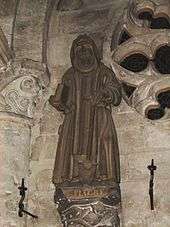Saint Fiacre
| Saint Fiacre of Breuil | |
|---|---|
|
Stained glass window, Notre-Dame, Bar-le-Duc, France, 19th century. | |
| Born |
7th century Ireland |
| Died | 18 August 670 AD |
| Venerated in |
Eastern Orthodox Church Roman Catholic Church |
| Feast | 30 August |
| Attributes | spade; basket of vegetables. |
| Patronage | medicine; gardeners; venereal disease sufferers |
Saint Fiacre (Irish: Fiachra, Latin: Fiacrius) is the name of three different Irish saints, the best-known being Saint Fiacre of Breuil, (died 18 August 670),[1] who built a hospice for travellers in what is now Saint-Fiacre, Seine-et-Marne in France.
Fiachra is an ancient pre-Christian name from Ireland. The meaning has been interpreted to mean "battle king",[2] or possibly a derivative of the word fiach "raven".[3] The name can be found in ancient Irish folklore and stories such as the Children of Lir.
Saint Fiacre of Breuil
Life

Fiacre lived in a hermitage in County Kilkenny. His unwanted fame as one skilled with herbs, a healer and holy man, caused disciples to flock to him. Seeking greater solitude, he left his native land and sought refuge in France, at Meaux.[1]
He approached St Faro, the Bishop of Meaux, to whom he made known his desire to live a life of solitude in the forest. St Faro assigned him a site at Breuil, in the region of Brie.[4] Here Fiacre built an oratory in honour of the Virgin Mary, a hospice in which he received strangers, and a cell in which he himself lived apart. He lived a life of great mortification, in prayer, fast, vigil, and the manual labor of the garden. He died on 18 August 670.
Legends
St Faro allowed Fiacre as much land as he might entrench in one day with a furrow; Fiacre turned up the earth with the point of his staff, toppling trees and uprooting briers and weeds. A suspicious woman hastened to tell Faro that he was being beguiled and that this was witchcraft. Faro, however, recognized that this was the work of God. From this point on it is said St Fiacre barred women, on pain of severe bodily infirmity, from the precincts of his monastery.[5]
Veneration

St Fiacre's relics are installed in Meaux Cathedral. The Roman Martyrology commemorates his feast on 11 August. Meaux continued to be a great centre of devotion to Fiacre, especially during the 17th and 18th centuries. Visitors to his shrine included Anne of Austria, Bousset, and Vincent de Paul.[6] St Fiacre had a reputation for healing haemorrhoids, which were called "Saint Fiacre's figs" in the Middle Ages. Cardinal Richelieu visited the saint's relics hoping for relief from this illness.[7] [8]
Patronage
St Fiacre is the patron saint of the French commune Saint-Fiacre. He is also the patron of those who grow vegetables and medicinal plants, and of gardening in general including Ploughboys.[7] To celebrate the Millennium, St. Fiachra's Garden was opened in 1999 at the Irish National Stud, Tully, County Kildare, Ireland.[9]
Saint Fiacre is commonly invoked to help heal people suffering from various ills, based on his reputed skill with medicinal plants. His reputed aversion to women is believed to be the reason he is known as the patron saint of venereal disease sufferers.[6]
He is also the patron saint of hemorrhoids, fistulas, taxi cab drivers, box makers, florists, hosiers, pewterers, tilemakers, and those suffering from infertility.[10]
Fiacre cabs
From about 1650, the Hotel de Saint Fiacre, in the rue St-Martin in Paris, hired out carriages. These carriages came to be known as fiacres, which became a generic term for hired horse-drawn transport. Although sometimes claimed by taxi-drivers as a patron saint, St. Fiacre is not recognized as such by the Church.[7]
Other St. Fiacres
Two other Saint Fiachra/Fiacres existed - Saint Fiachra, Abbot of Urard, County Carlow (Ireland) and Saint Fiachra, Abbot of Clonard.[2]
See also
- Graiguenamanagh, a village in County Kilkenny said to have been founded by Saint Fiacre.
References
- Notes
- 1 2 St. Fiacre. Catholic Encyclopedia. Retrieved 2007-12-06.
- 1 2 Ó Corráin, Donnchadh; Maguire, Fidelma (1981). Gaelic Personal Names. Dublin: The Academy Press. ISBN 0-906187-39-7.
- ↑ Hanks, Patrick; Hodges, Flavia (1990). A Dictionary of First Names. Oxford University Press. ISBN 0-19-211651-7.
- ↑ "Saint Fiacre". pagesperso-orange.fr. (in French)
- ↑ St. Fiacre - Catholic Online
- 1 2 Farmer, David Hugh (1997). The Oxford dictionary of saints (4. ed.). Oxford [u.a.]: Oxford Univ. Press. p. 183. ISBN 0-19-280058-2.
- 1 2 3 Marius, Richard. "Vita - Saint Fiacre", Harvard Magazine, 1998
- ↑ Gorlin, RJ. "Of heliotropes and hemorrhoids. St. Fiacre, patron saint of gardeners and hemorrhoid sufferers."
- ↑ "St. Fiachra's Garden", in Irish National Stud website, accessed 18 June 2014.
- ↑ Breverton's Encyclopedia of Inventions By Terry Breverton
- Sources
- Ní Mheara, Roísín (2001). Early Irish Saints in Europe - Their Sites and their Stories, Seanchas Ardmhacha: Journal of the Armagh Diocesan Historical Society.
External links
- Fiacre
- (Italian) San Fiacrio (Fiacre)
